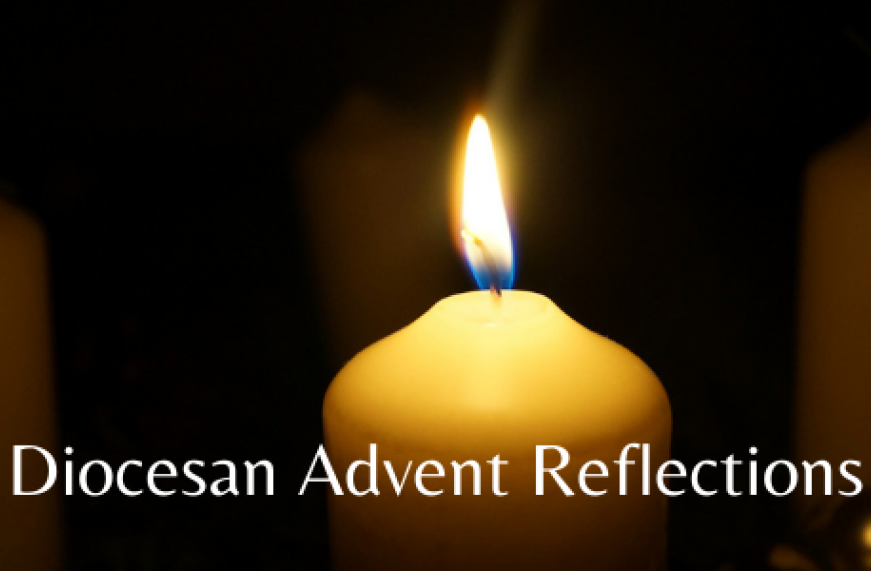Daily Advent Reflection: December 5

First Saturday of Advent
Psalms 20, 21:1-7(8-14) · 110:1-5(6-7), 116, 117
Isa. 4:2-6
1 Thess. 4:13-18
Luke 21:5-19
In this first week of Advent – the beginning of a new Christian year – we look to the first Christian writing, Paul’s First Letter to the Thessalonians, for the culmination of that which we prepare to celebrate in the reality of God’s incarnation. For the second time in that writing, Paul proclaims to us the foundation of our faith and the source which is our hope: “For if we believe that Jesus died and rose (4:14).” Only verses before is the earliest reference in the New Testament to the resurrection: “and to await his Son from heaven, whom he raised from the dead, Jesus, who delivers us from the coming wrath (1:10).” It is the bookends of those points – our foundational Easter faith and a new Advent – that create an upward spiral of orientation and journey that guide our hope and that which Paul exhorted his first Christian community to live in.
Christian hope is not for that which we already know or possess. It differs radically from optimism which seeks to create the same – to return to a known place of safety. Rather, hope seeks to change the underlying structures and realities that held the past, however pleasing, in search for a more just and righteous experience of the fullness God offers all. RORÁTE CAÉLI DÉSUPER, ET NÚBES PLÚANT JÚSTUM. (Drop down ye heavens, from above, and let the skies pour down righteousness.) This chant gives expression to the longings of Patriarchs and Prophets, and symbolically, of the Church for the coming of the Messiah which we await during Advent. Each time I have heard it sung in one of its many settings, it always produces in me a physical longing – a very deep experience of waiting and almost tasting the desire that saturates my spiritual being. And it awakens me to my restless nature and the paradox of my human activity which I feel must always be directed at a definite goal and product. It is during Advent when I become most keenly aware of my deepest longing for calm and rest and yet am caught-up in the culture that says I cannot wait or I’ll miss it.
As I write this, we are living in a western culture where Advent has not begun, but “Christmas” is already weeks old as artificial decorations have been dusted off and rehung (some only in hibernation since July). I am deeply aware of how much people, even and especially the non-religious, love and need Christmas. In our Christian tradition, we “need and love” Christmas by our very identity, yet we hold that we will not fully enter into that Incarnational moment unless we have waited in our own incarnation and experienced the deepest sense of longing that there must be more than this. To live apart from the anxiety of the world and know that there will be enough and more than the present moment offers is the core of our Judeo- Christian experience. It is the deepest experience of what sabbath means and the Incarnation expresses. The eyes of all look to you, and you give them their food in due season. You open your hand, satisfying the desire of every living thing. (Ps. 145:15-16) Biblical scholar Walter Brueggemann explains “the world is an anxiety-free one of well-being because the creator is anxiety-free and publicly exhibits that freedom from anxiety by not checking things out. God is not a workaholic. God is not a Pharaoh. God does not keep jacking up production schedules. To the contrary, God rests, confident, serene, at peace. God’s rest, moreover, bestows on creatureliness a restfulness that contradicts the “driveness” of the system of Pharaoh.” (Sabbath as Resistance, pp. 29-30)
As you wait through this coming month, I hope that you will entertain the possibility of saying “wait, wait, don’t tell me” and practice a sort of spiritual hibernation that those Christmas decorations were not afforded. It may be as simple as lighting a candle to dine by rather than illuminating a chandelier decked with holly and garland; it might be as intentional as not lighting the house until the twelve days of Christmas; it might be as dangerous as waiting until next week to buy your wreath and greens and risking that they may be sold out. I trust they will still be out there, though it may take a journey through deep woods to find them. I hope you will.
The Rev. Brad Toebben
St. Paul’s Episcopal Church, Milwaukee
